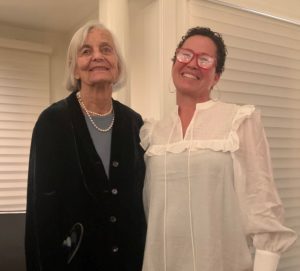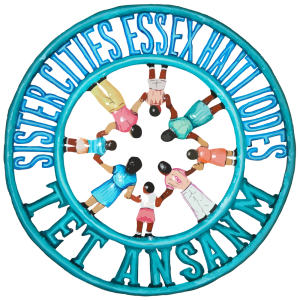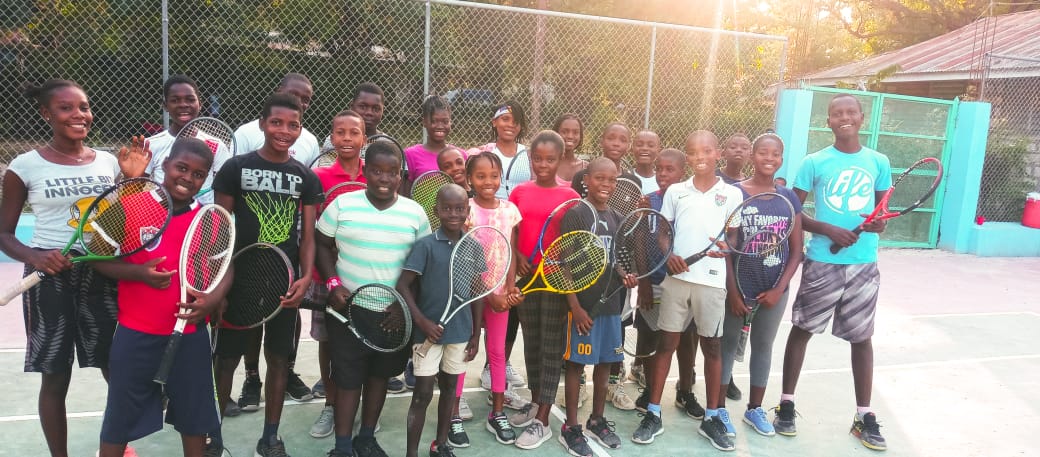
2021
Anny Frederique is our liaison in Deschapelles for the SCEH library. The following is a small look into her interesting life.
Beginnings – Ties to Deschapelles
Anny is the youngest of three children born to Esther Eshelman, a Mennonite nurse from Pennsylvania, and Gérard Frédérique, a Haitian ophthalmologist. Her parents worked at the Hôpital Albert Schweitzer (HAS) in Deschapelles, Haiti. Anny lived in Deschapelles until her family moved to Port au Prince when she was three. However, Deschapelles remained a primary source of experience in her life. Every summer the family visited for a vacation to reconnect with friends, HAS staff members, and the hospital’s benefactors Dr. Larry Mellon and his wife Gwen Grant Mellon. Jenifer Grant, daughter of Dr. and Mrs. Mellon, and one of SCEH’s founders was one of these friends.
Off to the US and then a return to Haiti
Most of Anny’s schooling took place at a private Catholic school for girls in Haiti. Beginning with her tenth year of instruction she was whisked away to an American school. Anny states “I remember thinking how odd it was to see boys and girls in a class together.” College years were spent at Goucher College in Baltimore, Maryland, and Eckerd College in St. Petersburg, Florida. Anny, homesick from being away from her family and country, moved back to Haiti shortly after getting her degree in marine sciences.
Start in the working world
Anny’s first job was as a representative with the World Wildlife Fund. While with the organization she helped set up a marine park. Later, Anny moved on to settle in Deschapelles and began her career association with the HAS’. She entered employment with the administrative team. In time, Mrs. Mellon, who knew about her passion for conservation, encouraged her to become part of HAS’ Community Development team. She had also read and followed the logic of Albert Schweitzer’s Reverence for Life, therefore, she made the decision to join the team. During her time on the team, one of her primary accomplishments was creating Ti Jaden (or small gardens). Ti Jaden encourages pregnant women to have small gardens close to home to produce food. Helping the community with reforestation and soil conservation has also been part of her work life.
Marriage, family, off to the US again, and the return to Haiti
In 1993 Anny met John Chew, an American missionary and a skilled builder, while he was working in the next town. They married, bought a farm in the Deschapelles area, and raised three sons. After years of steady life, a major decision was made to temporarily move the family to the US to make money to buy a tractor for the farm. The temporary situation lasted 13 years due to an international embargo on Haiti and political instability. The 2010 earthquake strongly prompted the couple decided to move back to Deschapelles to help the country rebuild. John helped with the construction of hospitals and schools. The family farmed their land and Anny, with the encouragement of Jenifer Grant, joined the Organization pour Development Economique et Social (ODES). ODES is a local Deschapelles development association with a mission to promote agriculture, stimulate the economy, plus improve and enhance education, culture, and the environment. Jenifer also encouraged Anny to follow her passion for libraries and tasked her with helping establish the SCEH library in Deschapelles.
Questions and Answers
We presented questions to Anny for more information about her life. Enjoy getting to know her.
You could choose to return to the US. What keeps you in Haiti?
I am still in Haiti as I am preoccupied with the future of our children, our environment, and our legacy. These are all long-term goals and are often thankless work. I am presently working on bird, or more specifically parrot repopulation, and habitat conservation.
Do you miss anything from your time living in the US?
I miss a level of organization that is not present in Haiti. My children are in the US and I miss them although we visit often.
You have worked for several organizations. Do you want to describe any of them?
I most enjoyed my first consultation in 1990 with the World Wildlife Fund, an initiative that brought together fishermen, ecologists, and the tourist industry in the coastal village of Lully Haiti.
Next, my work at HAS in Community Development and small gardens was priceless as I operated alongside people who had accomplished much in their professional lives, changing communities, and improving the quality of life for many, namely the Berggrens, the Flanagans, and the local community leaders.
More recently, in 2014, I spent two years with the World Bank’s Competitiveness and Innovations Program trying to put producers in a position to benefit more directly from the fruit of their labor and their production of mangoes, avocadoes, and honey to name a few. I learned about systems, trade, and innovative ideas.
Currently, I help manage JSC Construction, my family’s company, and this has helped us keep our favorite pastime, farming, afloat during the political and economic turmoil of the last two years.
What kind of crops do you grow on your farm in Cano?
We are peanut farmers but have diversified to legumes and we are now also planting orchards (namely mangoes).
Haiti is going through difficult times. You seem to be involved in several positive activities such as your Genesis Farm and the Sister Cities Essex Haiti programs. Will you tell us a bit about your work in these activities?
I am blessed to be able to work daily at our organic farm; we have a small team of men and women who accompany us as organic farming is laborious.
I thoroughly enjoy my work as a member of the Advisory Counsel of the library with old friends, meeting new ones and the upcoming generation gives me hope. My friends in Essex mean a great deal to me and they are so generous and dedicated. This is a daily inspiration in a country drowning in overpopulation, environmental degradation. and educational and medical challenges for which we see little hope of resolve. The library is a beacon in the grand scheme of despair. We need to augment the number of visitors, and this is the challenge year after year.
How do you think the programs including the library will help Haitians especially children and students who are the future of Haiti?
Our programs must be creative to attract users who are not used to reading for pleasure (this is not the case of the elite, this is mostly a dilemma in rural Haiti, and I imagine urban populous neighborhoods). We must draw them into the library and once they are hooked, we know that the young girls are less likely to have children at a young age, young boys will be less idle. We offer interesting panels and a variety of topics with mostly local professionals, but these vary in attendance.
What is your philosophy about aid to the community?
I am a product of the school of thought that one is to serve her community and that is a philosophy I grapple with daily. I believe that it is best to enable communities to believe in themselves and lift themselves up; this is a change that will take generations to happen and I do get very impatient!
Has the COVID-19 pandemic changed your work habits?
COVID-19, yes, national insecurity as well has hindered our movements. I travel a lot both around Haiti and abroad and so both covid and political turmoil has kept us home and farming.
What are some of the specific things that you do that you enjoy the most? What are your passions?
I love to read but do so mostly via audiobooks, I love to plant and to bird watch but unfortunately, most of my day is spent on organizing our busy workdays or on a computer either helping Terry Parkinson (SCEH Board of Directors member) to figure out budgets or handling boring accounting tasks for our construction company.
I recently took a three-hour hike on the other side of the river where I live. I was reminded of how much I love to walk and discover new countryside. I love to write, and I am still trying to edit a book/journal that I wrote in 2011 after our return to Haiti.

